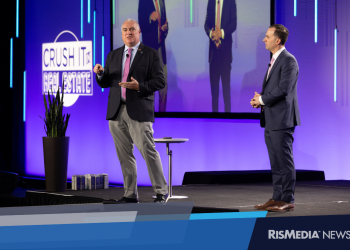In this exclusive interview, Rocket Mortgage® Executive Vice President of Purchase Adam Speck discusses growth strategies and how real estate professionals can set themselves up for success as the future unfolds.

Paige Tepping: Tell us how you got started with Rocket Mortgage, how it led to your current role, and what exactly your role is.
Adam Speck: I started with Rocket Mortgage as a mortgage banker 17 years ago when I was fresh out of Michigan State University. I’ve always been passionate about helping clients, specifically those who are refinancing or in the process of buying a home, and during the 2007 – 2008 housing crisis, I leaned more fully into the real estate agent relationship. From there, I moved into a position where I was responsible for leading a team of mortgage bankers before spearheading an initiative that focused on helping homebuyers get financing for home purchases. I then transitioned over to Rocket HomesSM as the chief revenue officer, a position that provided a glimpse into the real estate agent’s perspective, a completely different side of the equation. Most recently, I assumed the role of executive vice president of the entire purchase segment.
PT: What are your primary roles and responsibilities as executive vice president, and what is your favorite part of your job?
AS: My primary role is developing our culture and our people within the purchase banking arena while helping create and execute the strategy surrounding the client and agent experience to drive results. The relationships I’ve forged along the way would have to be my favorite part of the job.
PT: From your perspective, what does it mean to be a successful real estate professional in today’s environment?
AS: What we’ve seen over the last few years, and in today’s market specifically because of the inventory shortage, is a different speed to the game. This was also further exacerbated due to the pandemic. That said, it’s important to note that successful real estate professionals are extremely client- and solution-focused. Constantly looking for solutions to help their clients achieve their real estate goals, successful agents recognize that buyers and sellers may not always get what they want in the moment, but by working together, they can show their clients what it’s going to take to accomplish those goals. They’re high-level communicators who understand the importance of listening to fully grasp the client’s unique situation. Drilling down further, successful real estate professionals respond with a sense of urgency and are knowledgeable about the market. They’re aware of what’s happening in the industry—on both a hyperlocal and macro level—and are clued into new products and processes that will ultimately help them catapult their success to another level. In the end, it’s all about understanding the client’s goal and current situation while being able to adapt and move quickly.
PT: As the industry continues to evolve, how can real estate professionals set themselves up for lasting success?
AS: If you’re looking to set yourself up for lasting success, the last year or so has proven just how important it is to be adaptable. As the industry continues to evolve, there are going to be things that will always matter—no matter the market. First and foremost, it’s important to cultivate the relationships with clients, lenders, title companies and even other agents. Setting yourself up to flourish also involves developing a track record and reputation for success in the markets you serve. You want to be known as the agent who can help buyers and sellers achieve their goals, and whose main focus is the client. Like one of our core philosophies, or ISMs, agents must be obsessed with finding a better way.
PT: When it comes to growth, what specific strategies should real estate professionals be focusing on?
AS: One thing I’ve come to notice throughout my 17 years with the company is just how much speed matters, especially today. When I first entered the industry, it was acceptable for real estate professionals to return a phone call or email by the end of the day it was received. Today, with information readily available at everyone’s fingertips, every second counts.
PT: In what ways do you see these strategies evolving as we head toward the future?
AS: While we’ve been in a seller’s market for quite some time now, inventory is beginning to open up, which is going to change the game as we flip to a buyer’s market. As the market begins to shift, listing agents will have to get more creative because we’re no longer going to see houses flying off the shelves or receiving multiple offers. In addition, agents are going to want to know and understand the different products available to help their clients. I also believe that the stigma around financial products will begin to dissolve as we continue to combat rising interest rates and inflation, showing clients that owning a home is still affordable. The past year has been all about trying to find listings, but we’re about to enter a new phase where the name of the game will be scoping out motivated and qualified buyers.
PT: What are your top tips for real estate professionals who are looking to level up their business?
AS: In addition to everything I’ve mentioned, if you’re truly looking to level up your business, you must remain humble and stick with what works. As the competition continues to heat up, it’s going to become increasingly important to find (and leverage) your differentiator, or the one thing that separates you from all the other real estate professionals in your market. When the success begins pouring in, people often move away from what got them there in the first place, but you must continue to stay grounded with what works. Getting back to the basics infers that you left them behind at some point, but it’s crucial that you commit to them and never move away from them.
PT: Why is it important for real estate professionals to focus on these specific areas if they’re looking to get to the next level?
AS: The client’s experience should be at the top of everyone’s mind, making it crucial to focus on good communication skills, approach each and every situation with a solution-focused mindset, and set realistic expectations from the get-go. Focusing on these specific areas will go a long way toward helping you build a reputation that matters.
The above article is sponsored content. For more information, visit https://www.rocketproinsight.com/.












